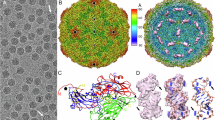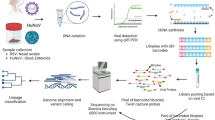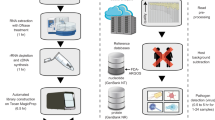Abstract
A new type of human calicivirus (HuCV) showing the classic cup-shaped surface morphology was identified in the stool sample from a child with symptoms of acute gastroenteritis in Seoul, Korea (SK virus). Genomic RNA was extracted directly from the stool sample, and the nucleotide sequence of 3.2 kb of the 3' end of SK virus was determined from cDNA. This region spanned sequences from the RNA-dependent RNA polymerase (RDRP) region in the open reading frame 1 (ORF1) to the 3' poly A tail. The non-structural and capsid protein coding sequences were fused in a single ORF as observed in Manchester type (Genogroup III). However, ORF2 of Manchester virus was missing in SK virus. In RDRP region, SK virus showed amino acid and nucleotide identities of 74-75% and 68-69% respectively, with those of Manchester virus, while showed 34-46% and 55-60% identities respectively with those of other human caliciviruses. However, capsid protein of SK virus showed a partial (29-46%) amino acid identity with those of other caliciviruses including Manchester type. The closest resemblance in amino acid (97-99%) and nucleotide sequence (85-86%) identities were found in RDRP region with Vanderbijlpark and Pretoria isolates recently found in South Africa. These results suggest that SK virus together with Vanderbijlpark and Pretoria isolates belong to a new type different from Manchester virus.
Similar content being viewed by others
Article PDF
Author information
Authors and Affiliations
Rights and permissions
This is an Open Access article distributed under the terms of the Creative Commons Attribution Non-Commercial License (http://creativecommons.org/licenses/by-nc/3.0/) which permits unrestricted non-commercial use, distribution, and reproduction in any medium, provided the original work is properly cited.
About this article
Cite this article
Han, DP., Lee, HW., Sohn, J. et al. The new genotypic human calicivirus isolated in Seoul. Exp Mol Med 32, 6–11 (2000). https://doi.org/10.1038/emm.2000.2
Published:
Issue date:
DOI: https://doi.org/10.1038/emm.2000.2



